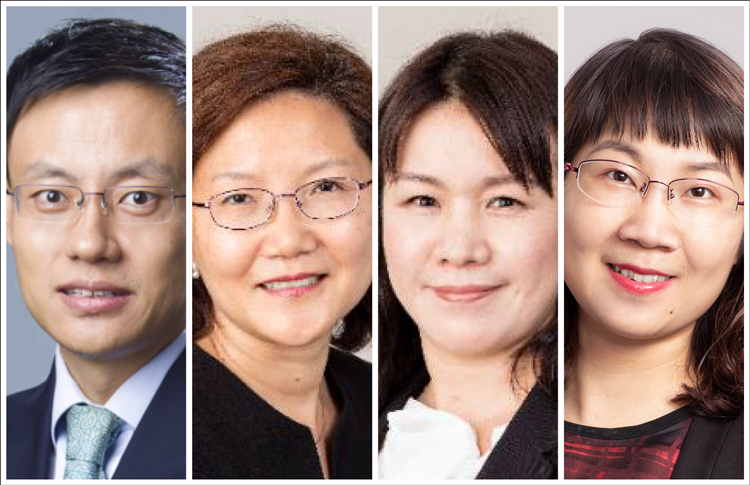
On Aug. 11, the Standing Committee of China’s National People’s Congress (NPC) passed a decision to implement pilot measures that will allow Hong Kong lawyers to practice in nine cities in the Greater Bay Area. Lawyers in Hong Kong and on the mainland say the measures provide more room for the professional development of Hong Kong lawyers, and facilitate the growth of legal services on the mainland.
How will the new measure help integrate the legal services markets of the Mainland and Hong Kong
ALAN XU, partner, Zhong Lun Law Firm
The new measures will play an important role in integrating the legal services markets of the Mainland, Hong Kong and Macau. Under the new measure, it is expected that more lawyers from the three jurisdictions will cooperate, mainly through associations between law firms, after the barriers to entry into the mainland market have been lifted. In fact, in July last year, the Guangdong Department of Justice had issued a measure to facilitate the joint operation of law firms of these three jurisdictions in Guangdong Province, by removing the requirement on the minimum capital contribution of non-mainland law firms. This trend of encouraging cross-jurisdiction legal partnerships in the Greater Bay Area has been followed and strengthened by the NPC’s decision, which further opens the mainland market to qualified lawyers from Hong Kong and Macau. The partnerships between the mainland and Hong Kong/Macau law firms may become a common mode of cooperation in the market, to provide the one-stop cross-jurisdictional legal services in the Greater Bay Area for clients, such as Hong Kong enterprises conducting business in the Mainland.
The new measure also addresses the imbalance between a growing need for foreign-related legal services and a relatively small number of competent lawyers in the Mainland. With the Chinese government continuously rolling out new legislation and policies facilitating outbound investment, enterprises on the mainland have more access, and, needless to say, more risk exposure, to global transactions and become more easily involved in foreign law matters. The proposed cooperation under the new measure is a good chance to satisfy such need for foreign-related legal services.
VERA SUNG, partner, and ANGEL LUO, registered foreign lawyer, Oldham, Li & Nie
Due to new measures recently put in place, eligible Hong Kong lawyers who have passed the qualification exam for Guangdong-Hong Kong-Macao Greater Bay Area and obtained mainland legal qualifications will be able to practice in specific areas on the mainland. It will provide more room for the professional development of Hong Kong lawyers and facilitate the growth of legal services on the mainland.
Through studying Chinese law and obtaining legal qualifications in the Greater Bay Area after passing the exam, Hong Kong lawyers will be able to help resolve the differences and conflicts of laws between the two jurisdictions. They will be able to more effectively integrate the legal resources of the two regions in legal practice, such as arbitration and mediation legal services, the implementation and protection of intellectual property rights, commercial dispute resolution and litigation, and marriage disputes.
With Hong Kong lawyers beginning to practice in the Greater Bay Area and the future development and needs of the region, the scope of law in which Hong Kong lawyers are permitted to practice in the region will likely be extended in the future to include areas such as administrative and criminal litigation cases.
HELEN LIAO, partner, Deacons
Given the current domestic and international circumstances, the central government’s decision is an important move to further integrate the legal services markets in the region. We believe there are opportunities as well as challenges.
Firstly, we can foresee that this new initiative will create new room for growth for Hong Kong and Macao lawyers, and the area, scope and content of our practice can be extended.
Secondly, from the perspective of economic development, this measure will bring notable practical significance and effects to companies in the Greater Bay Area. In the future, the demand for legal services will be stronger. Companies in the three jurisdictions have been experiencing institutional barriers, professional barriers and service implementation barriers in many aspects, such as the application of law, foreign law ascertainment, conflict of laws and dispute resolution. As the pilot rolls out, Hong Kong and Macao lawyers will be able to practice on the mainland, which will make it easier for companies to resolve these issues.
Thirdly, from the perspective of the development of the legal services industry in the Greater Bay Area, this measure will also have a very positive impact. As the pilot programme rolls out, the resources and expertise of the legal services industry in the region will be integrated. With everyone interacting and cooperating on the same platform, the Greater Bay Area will see legal services increase in volume and gradually in scale.
In the past, lawyers mainly provided services to mainland companies to list and issue stocks in Hong Kong. Thanks to the new measure, Hong Kong and Macao legal practitioners will be able to work on the mainland, which will allow companies to feel more reassured about extending their business to the mainland. Similarly, mainland companies will feel more reassured about doing business in Hong Kong and Macao, as lawyers from both cities can practice on the mainland. The focus of the legal sector, therefore, will not change, and there will be a greater volume of business.
That said, the details of the examination and its assessment are yet to be unveiled. Uncertainties remain about the exam format and pass rates, including the proficiency requirements in Putonghua and Chinese writing. In addition, whether there are political vetting and operational standards is also a consideration, including whether there are interviews and visits, the times and locations of closed-door training, and the length of the internships.
Then, competition will intensify in the legal services market. Law firms will compete more fiercely to recruit legal talents with dual publications. For young lawyers who have just joined the industry, resources could be a concern, as they may worry about the difficulties in competing with local lawyers and winning the trust of their clients.
Finally, we hope to see further relaxation of the policy which will allow qualified Hong Kong and Macao law firms to directly set up offices in the Greater Bay Area instead of just representative offices or partnership associations. When only individuals, but not law firms, are allowed to practice, this policy may not be as appealing or effective as expected. Traditionally, 80 percent of the market share is taken up by 20 percent of the law firms on the mainland. Only by allowing Hong Kong and Macao lawyers to compete for relatively high-end business can the industry integrate in a truly meaningful way.
To contact the editorial team, please email ALBEditor@thomsonreuters.com.
